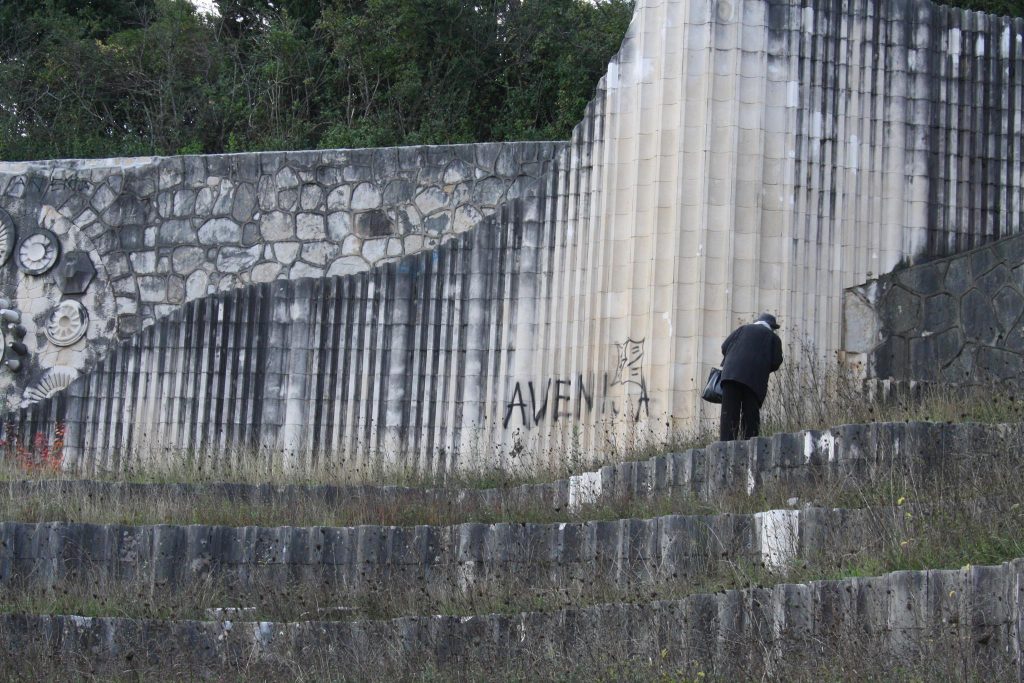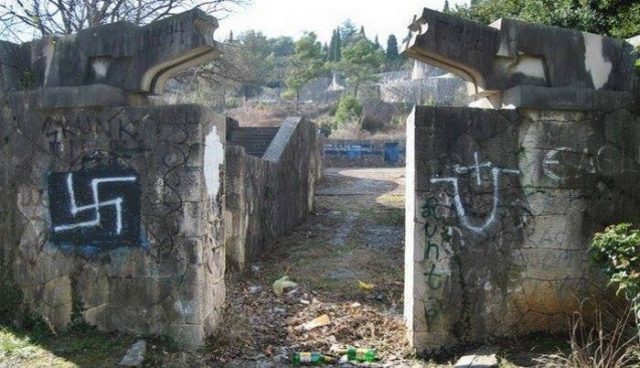
There are ongoing debates and discussions in Mostar surrounding the reconstruction and renovation of the Partisan Memorial Cemetery. Even though 72 years have passed since World War II, revisionism is still present on the territories of former Yugoslavia.
There are ongoing debates and discussions in Mostar surrounding the reconstruction and renovation of the Partisan Memorial Cemetery. Even though 72 years have passed since World War II, revisionism is still present on the territories of former Yugoslavia.
The Partisan Memorial Cemetery serves as a universal symbol by virtue of the message it sends and because of the reasons behind its existence. At one point in history, fascism had been defeated, but it’s making a comeback to the city on the Neretva River. This is supported by the many attempts to destroy or delay the renovation of this cemetery in an effort to forever erase the names of the brave men and women of Mostar from the city’s history. It’s also important to emphasize that there are certain groups of young people who regularly participate in the desecration of this memorial, with no adequate response from the authorities, i.e. the institutions of the broken local government. Penalties and sanctions are not applicable in this case. In 2003, the Mayor’s office established the Partisan Commemorative Cemetery Renovation Committee, however, no progress has since been made, nor has the renovation even been started after all these years. This is primarily due to a lack of political will, which also resulted in a lack of financial resources.
In completely abandoned surroundings, the memorial stands defiant, but alone. Then, every year on 14 February, which marks the day of Mostar’s liberation from fascist occupation during WWII, the memorial becomes the center of attention. Anti-fascists from across Bosnia and Herzegovina (BiH) and the former Yugoslavia, come to pay tribute to the fallen heroes and heroines. It is certain that all attendees share the same wish – to see this monument in all its former glory, with its stone tablets radiantly shining in remembrance of those to whom the memorial is dedicated.
In 2006, three years after a formal request was made under the initiative of the WWII Veterans Association (SUBNOR) of Mostar, the Partisan Memorial Cemetery was included on the list of national monuments of BiH. This accomplishment gave SUBNOR the legitimacy to oversee the implementation of the monument’s restoration and maintenance, as well as to propose steps in its preservation.
The struggle of Sead Đulić provides the best indicator of the efforts that are required in the fight for the acceptance of universal and civilized values as a common good in a dysfunctional city. After he was elected president of the Association of Anti-fascists and Fighters of the National Liberation War (NOR) Mostar (“Udruženje antifašista i boraca NOR-a Mostar”), he actively and constructively sought support to renovate the Partisan Memorial Cemetery from local and state institutions and non-governmental and international organizations.
When asked why the restoration of this monument is important, Sead Đulić responds: “The Partisan Memorial Cemetery is our Statue of Liberty, our triumphal arch, our Taj Mahal. Let’s take into consideration those peoples and cultures and their relationships with the aforementioned monuments. The Memorial Cemetery is the City of the Dead juxtaposed with the City of the Living. It is a reflection of Mostar and its history. To abandon this monument is to give up on ourselves and the city of Mostar.”
He emphasized that every eighth citizen of Mostar has given his or her life in the fight against fascism and that the memorial must also serve as a vision for the future.
“To renounce anti-fascists means to stand on the other side, on the side of anti-civilized teachings. That’s why it’s a monument for the future, for the education of future generations based on the ideas of anti-fascism, humanity, and love for the city and the country. A day spent at this memorial is an inspiration for a better understanding of life and love, but also death, sacrifice, and belief in an idea and a vision,” added Đulić.

The Mostar city authorities didn’t have a lot of empathy or understanding regarding the importance of this project. However, as part of its 2017 budget, the city planned to spend 30,000 KM on the clean up of the memorial, which has been done, but only after the Committee for the Restoration, Revitalization, and Preservation of the Partisan Memorial Cemetery was established, which operates as a part of the NOR. Thus, although it is primarily the private committees that are leading the cleanup and sanitation of the memorial, it’s clear that the city has finally taken a first step. Whether it will take additional steps to restore the memorial remains to be seen.
“I don’t know if the city will support the restoration at this time. Most of the people currently running the city believe the site should be repurposed and used for something else. They even already have project plans for that. The reason it is difficult for them to proceed with such plans is the fact that the memorial has been listed as a national monument of BiH. Additionally, many of the anti-fascists are well-organized, and we are not alone. But, through neglect, they encourage those who want to destroy the monument to continue damaging it until it is impossible to repair. If this were not the case, they would have protected it by now. They don’t have to help, but we’ll force them to stay away until they leave the political and historical scene. The Partisan Memorial Cemetery will be restored in spite of everything and everyone,” said Đulić.
Sead Đulić emphasizes that Mostar is a city that has given up on its past.
“When a city loses its centuries-old identity, when it’s being served new values, it’s easy to create an environment for the emergence of neo-fascism. If every day you walk along streets named after the fascist ideologues and warmongers of World War II, and the system is telling you that they’re national heroes, then it becomes clear why fascism in Mostar is growing and why it isn’t being sanctioned,” says Đulić.
In this kind of political environment, which seems to supports neo-fascism in Mostar’s streets, society cannot follow the roadmap of civilized values. No one is fighting this, the society is quiet. The question is: what is needed to stop the rhetoric of neo-fascism? Courage, absolutely, but also determination to make Mostar a city of freedom and equality.
Another simple question that must be posed: why is it important for society to consider historical events after so many years? If you analyze the perception of the two ideologies in BiH society—fascism and anti-fascism—it becomes clear that there is still a lack of understanding regarding the intentions of those who spread, among other things, radical and aggressive nationalism. Today, talk surrounding the role of Nazi collaborators who operated on the territory of the former Yugoslavia, as well as the heroic undertaking of the NOR and the Partisan forces who liberated the occupied territory, remains foggy. As if the very mention of these roles causes a dose of reticence.
However, we must bravely face the past and talk about the established facts. After Mostar was liberated from the fascist occupation of the Wehrmacht on 14 February 1945, the people of Mostar proved its commitment to anti-fascism and the Partisan Memorial Cemetery was the response of the victors. The architectural masterpiece of Bogdan Bogdanović, which was officially opened in 1965 in the presence of the then-president of the Socialist Federal Republic of Yugoslavia, Josip Broz Tito, is a reflection of the past and of the stories of those individuals who fought for freedom. But the memorial is not only an account of the past, it is also a monument for the future generations, who must be made aware of the dangers fascism poses.






